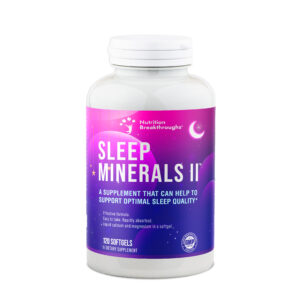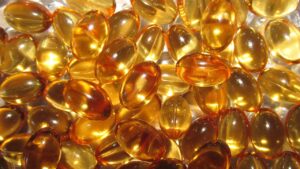 Sleep Minerals II: New Reviews of Top Sleep Aid
Sleep Minerals II: New Reviews of Top Sleep Aid
There are a high percentage of people who encounter nightly insomnia and sleeplessness all over the world.
In the United States, the National Sleep Foundation reports that up to 25% of adults have tried sleeping drugs in an effort to get some sleep. These medications come with extensive side effects and are not always effective.
Sleep Minerals II from Nutrition Breakthroughs is a natural sleep aid that contains highly absorbable forms of calcium and magnesium. Customer reviews show that it works well for sleeplessness and insomnia, as well as for heart health, restless leg syndrome, bone strength, muscle cramps, menopause insomnia, hot flashes, night sweats, and teenage insomnia.
Sleep Minerals II also contains vitamin D and zinc and is delivered in a softgel form mixed with natural rice bran oil, making it better assimilated than tablets or capsules and providing a deeper, longer-lasting sleep.
James F. Balch, M.D., author of “Prescription for Nutritional Healing,” writes that: “A lack of the nutrients calcium and magnesium will cause you to wake up after a few hours and not be able to return to sleep.”
Here are some of the latest reviews of the Sleep Minerals II sleep aid from customers all over the world:
S.K. of Indianapolis, Indiana says: “I have been using Sleep Minerals II. I use it religiously every single night. I suffered from YEARS of anxiety-related insomnia. Nothing helped. My doctor couldn’t find a medicinal combination of medications to treat my anxiety well enough to allow me to get some good sleep. On my first night of Sleep Minerals II, I was able to sleep all the way through the night. I’ve been using it for almost two years now. I am absolutely 1000% satisfied with this product and have even recommended it to my friends and family when they discuss their sleep issues with me.”
K. C. of Homer, New York says: “I am writing to you a true believer of Sleep Minerals II. I never write product reviews…. good or bad. I had originally ordered your sleep minerals product and thought I would give it a try. Well I had given it to the entire family. We ran out of it and I really thought it wasn’t working. I quickly realized within a couple nights that without them the entire household was not falling asleep as easily as they were before! So I immediately ordered more. I will not let that happen again.”
For more information, visit the Sleep Minerals II page.
I.C. of Ontario, Canada says: “I have Lupus, which is an autoimmune condition. I’m not allowed to take vitamins like vitamin C or anything that builds up my immune system. If I do, my immune system gets stronger and attacks me. I have diabetes, a thyroid condition, arthritis and other issues. The Sleep Minerals is just subtle enough that it helps me sleep and gives me the minerals I need – especially calcium. I have arthritis throughout my whole body and the minerals help this a lot. In fact, the Sleep Minerals lessens all of my symptoms greatly and has helped me to go into remission.”
W.W. of Perth, Australia says: “I have been taking the Sleep Minerals for the past 15 nights and am noticing an improvement in my ability to go back to sleep when waking during the night. I have also been able to start reducing the medication that I have been taking for the past 7 years for sleep. I will definitely keep taking them and hope to keep reducing the prescription meds and continue to feel more rested during the day.”
For more information, visit the Sleep Minerals II page.
J.H. of Manitoba, Canada says: “Sleep Minerals II has made a huge difference in my life as I was having debilitating leg cramps that used to occur every night. My legs were sore even into the next day. These have now become history. My sleep is also so much better and now I don’t worry constantly about my calcium and magnesium levels. I am 70 years old and look forward to a very healthy old age. I suffered with sleep deprivation for a very long time and I will continue to pass the word on to my friends about how Sleep Minerals II has changed my life.”
M. T. of Tasmania, Australia says: “I received the Sleep Minerals II about a week ago and have been taking the softgels about an hour before bed. The last two nights I have slept well. The best side effect I have found, however, is that the night sweats and hot flashes I had constantly throughout the day, have almost completely stopped. And if I do have one, it is 95% less than I previously experienced. So far I’m very happy with the Sleep Minerals.”
For more information, visit the Sleep Minerals II page.











